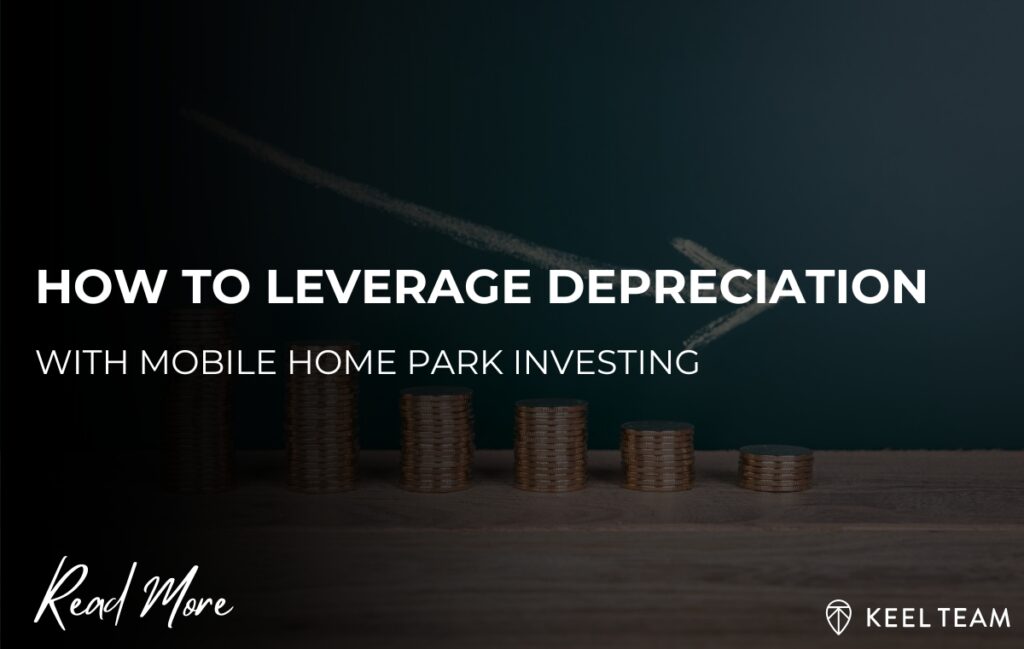How to Leverage Depreciation with Mobile Home Park Investing
-
 Tristan Hunter - Investor Relations
Tristan Hunter - Investor Relations

Mobile home park investing can offer potential returns. However, understanding depreciation is key to potentially maximizing tax benefits and improving cash flow. The depreciation schedule for mobile home parks varies based on the type of assets being depreciated. Here is an overview based on current tax guidelines:
Depreciation Schedule for Mobile Home Parks
Land Improvements
You can typically depreciate items such as roads, utility connections, sewer systems, sidewalks, and other infrastructure components over a 15-year period. This accelerated depreciation schedule enables quicker cost recovery compared to the standard residential real estate schedule of 27.5 years. Utilizing this faster depreciation schedule can help enhance your cash flow and overall returns more effectively.
Buildings and Structures
Depreciate buildings within the mobile home park, like offices, community centers, and maintenance sheds, over 27.5 years if they are used for residential purposes. If these structures are considered commercial buildings, the depreciation period extends to 39 years. This distinction affects how quickly you can recover costs and how much you can deduct each year.
Personal Property
Depreciate items like furniture, fixtures, and equipment considered personal property over shorter depreciation schedules, typically ranging from 3, 5, and 7 years. Using a straight-line method for these assets allows for faster recovery of investment costs. This category includes office equipment, maintenance tools, and other movable property that supports the operation of the mobile home park.
Download our FREE eBook! Review the top 20 things Andrew Keel has learned from investing in mobile home parks.
Utilizing Cost Segregation Studies
Cost segregation studies accelerate depreciation by breaking down the property into individual components. By identifying assets eligible for shorter depreciation periods, you can reclassify certain components to depreciate over 3, 5, 7, or 15 years instead of the standard 27.5 or 39 years. This approach can significantly enhance tax benefits and improve your overall return on investment.
Leveraging Bonus Depreciation
Bonus depreciation allows for even faster depreciation of qualifying assets. As of 2024, bonus depreciation stands at 60%, meaning you can deduct 60% of the cost of eligible property in the first year. This percentage will phase out incrementally, decreasing each year until it is eliminated in 2027. Utilizing bonus depreciation can significantly increase after-tax returns by allowing a substantial portion of the investment to be written off immediately. This method provides immediate tax relief and improves cash flow, which can be reinvested into further improvements or other investment opportunities.
Example Calculation
Consider a mobile home park purchased for $1 million, with 60% of its value ($600,000) allocated to depreciable assets. Here’s how the depreciation might be structured:
- Land Improvements (15 years): $300,000
- Buildings (27.5 years): $150,000
- Personal Property (5-7 years): $150,000
In the first year, with bonus depreciation at 60%, you could depreciate personal property and land improvements immediately, leading to significant tax savings.
Strategic Planning
Collaborate closely with tax professionals to accurately implement these strategies. Regularly review and update your depreciation schedule in light of current tax laws to ensure maximum tax benefits and compliance with IRS regulations. Tax professionals typically provide valuable insights and help tailor strategies to individual investment scenarios, optimizing potential tax benefits and enhancing overall profitability.

Potential Financial Impact
By leveraging these depreciation strategies, you can significantly reduce taxable income, thereby enhancing cash flow for further investments. Here’s a detailed breakdown of the financial impact:
- Initial Purchase Price: $1,000,000
- Depreciable Basis: $600,000 (60% of purchase price)
- Reclassified Basis for Shorter Lifespans: $180,000 (30% of depreciable basis)
- Immediate Bonus Depreciation: $180,000
This substantial deduction likely reduces taxable income, potentially increasing cash flow for further investments. The remaining depreciable basis continues to depreciate over the standard 27.5 years, potentially providing ongoing tax benefits.
Planning for the Future
As you plan your investments in mobile home parks, consider the likely benefits of these tax strategies. Work with a tax professional to understand how cost segregation and bonus depreciation might be applied to your investments. Regularly review your tax strategies in light of any legislative changes to ensure you are maximizing your potential returns.
Conclusion: A Strategic Opportunity
The strategic use of cost segregation and bonus depreciation offers mobile home park investors a potent combination that can minimize taxes and maximize returns. With potential changes in tax legislation likely favoring investors, now could be an opportune time to reassess tax strategies. Consulting with tax professionals helps leverage these advantages fully. While it requires dedication and expertise, the rewards of mobile home park investing could be substantial. Happy investing!
Learn more about mobile home park investing.
Interested in learning more about mobile home park investing? Get in touch with us today to find out more.
Disclaimer:
The information provided is for informational purposes only and is not investment advice or a guarantee of any kind. We do not guarantee profitability. Make investment decisions based on your own research and consult registered financial and legal professionals. We are not registered financial or legal professionals and do not provide personalized investment recommendations.

Tristan Hunter - Investor Relations
View The Previous or Next Post
Subscribe Below 👇





